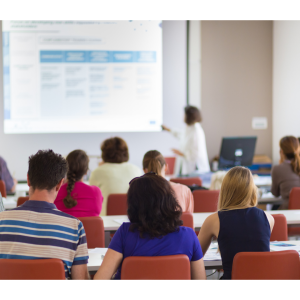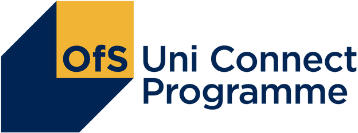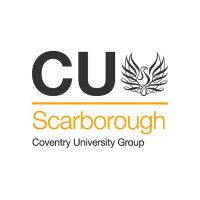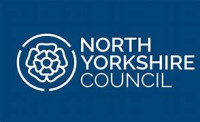
Hi everyone! My name is Hannah, a 3rd year undergraduate student, studying Education Studies & English Language at York St John University, but I’m originally from Birmingham!
I’ve always had a passion for English Language (mainly because it was one of the subjects that I was naturally good at, but I also found it very interesting), and I have always been interested in being a teacher, so combining these two subjects in a Joint Honours Degree was the perfect option for me!
I find the English Language so fascinating to study – you don’t actually realise how much is incorporated with linguistics (the science of studying language) as language affects every single second of your day! From text messages to road signs, if something is conveying some form of meaning, you can analyse it – which is what I find so fascinating! I love how every single person uses language differently (everybody has their own language fingerprint, making you unique to somebody else), as lots of different things impact the way we use language. This can include your region (either where you were born, or possibly any places you have moved to who use different words/accents), occupation (perhaps having specialist terminology), and even your gender and who you identify as affects your language! Sub-topics like these come under the “Sociolinguistics” umbrella as they are social factors affecting your language – and they can all be studied in depth! Other aspects of linguistics I could opt to study include Psycholinguistics (how the brain works with language), Forensic Linguistics (language in the criminal justice system, including deciding if somebody is guilty just from their voice!) or even Child Language Acquisition (how we learn to speak, write, and understand language)!
However, as I said, I study a Joint Honours course, meaning that I also study Education Studies at the same time. I am lucky with my course as I don’t have to split the subjects 50:50, so could do more English Language if I wanted to, but not all Joint Honour courses offer this, so it’s always worth checking.
I wasn’t as ‘knowledgeable’ as such in Education Studies before arriving at university – obviously, I knew what education was and had experienced it like anyone else, but I had never considered so many aspects that contribute to it! The history of education, questioning the purpose of it (like why do we even go to school?!), different factors that can affect a person’s education journey (i.e. Special Educational Needs or even the area that they live), as well as the specific content taught in schools around the world are all examples of things I have studied on that half of my course. At the start, I told you that I initially chose my degree because of wanting to be a teacher, but since studying my degree I have realised there is so much more to education other than being a school teacher, so I’ve now decided against the idea and to investigate other roles in education that suit my personality even more!
There are so many things I love about my course, from the fact that it only has one exam within the 3 years (I am definitely somebody who favours coursework-type assignments over exams), alongside the other types of assignments we get to do. We obviously do the critical, written work that naturally comes with a degree, but we also get to be creative, including creating our own curricula (what we would tell teachers to teach if we were in Government!), and even creating portfolios about the work experience we complete as part of the course!
We are lucky at YSJ that every course you choose has some form of employability element, so if getting work experience is a priority of yours, make sure you choose a university that offers some form of placement! I chose my work experience in the English Language side, but you still can do any sort of placement that you want! You organise it all yourself and then write reflective blogs about what you learnt on the placement and how it is helping you decide what career path you want to take. For me, I managed to secure 3 interesting placements: 2 in school settings, as I was still interested in school teaching at this point, and 1 at the City of York Council, working for the local education authority which is where my eyes were opened about how much ‘behind the scenes’ work goes into delivering education in a particular area.
After I finish my degree, I am looking at going into either Marketing & Communications (linking with my English Language) or becoming some sort of Learning & Development officer in a business (an example of still ‘teaching’ but not in a typical school setting). If I wanted to still go down the teaching route, I would still need to complete a PGCE after my degree as you do not get QTS (Qualified Teacher Status), but it definitely prepares you for that!
So, I have lots of different pieces of advice depending on what aspect of my course sounds most appealing to you:
If you are interested in the idea of Joint Honour degrees, definitely look around for them! Lots of universities offer them, and some of the subject combinations aren’t even necessarily related, but if you’re torn between two subjects like I was, then it’s definitely worth finding out if they are both an option!
If you are interested in English Language & Linguistics, particularly if you enjoy it at GCSE/A-Level, then go for it! The majority of A-Levels in English Language are the starting point in your first year at undergraduate level, so you are likely to come to university with a lot of knowledge already! The degree is so versatile that you can go on to lots of different careers including Speech & Language Therapy, Business Development, or perhaps Marketing & Communications (all examples of jobs our alumni (past students) have)!
If you are interested in education, and maybe becoming a teacher but you aren’t wanting to commit to a degree that has automatic QTS at the end, then Education Studies is definitely something for you, as you realise the actual scope of education and how there is so much you can do other than being a teacher!
Back to all news stories












